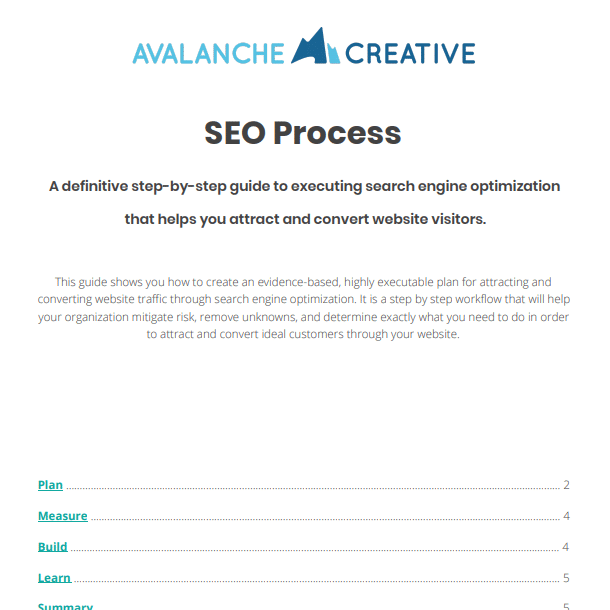What Is Enterprise SaaS SEO?
Category: Search Engine Optimization | Tags:
SaaS companies with an established digital marketing strategy may already be familiar with the concepts behind SEO. However, there’s another way to segment your strategies even further to attract larger customers to your services.
Enterprise SaaS SEO is the tools and techniques that software firms use to target large for-profit businesses, typically with hundreds of employees and unusually complex business needs.
Just as your SaaS firm’s enterprise-level customers have unique needs for your software, they also require a unique approach to digital marketing and SEO. Discover what sets enterprise SaaS SEO apart, along with the tactics and strategies your SaaS brand can use to acquire more of these large, high-revenue customers.
Benefits of Enterprise SEO for SaaS Companies
More people are using search engines like Google than ever to make their business decisions—including your software’s enterprise-level customers. On top of being an essential way to engage with customers of all sizes, there are multiple reasons why you would want to promote your enterprise-level offerings with SEO tactics and strategies.
Refines Your Targeted Marketing Strategy
Tailoring your content to target enterprise-level SaaS customers allows you to make your targeting strategy even more of a precision instrument.
While you may already be using your marketing strategy to reach businesses within certain industries or departments, you can also refine your strategy even further by separately targeting small- or medium-sized businesses and enterprises. This allows you to improve the customer experience for both groups while making both of them feel like you’re addressing their unique needs.
Attracts Larger Customers
Chances are, if a company is willing to look for the sophistication your enterprise-level software offers, at least one of these things is true:
- They’re a large business that needs to accommodate a whole team of people.
- Their processes are spread across multiple platforms and they’re looking to consolidate to an all-in-one setup.
- They’re looking for a solution that can provide the intricate analytics they need to succeed as a large organization.
While other circumstances might lead your enterprise-level customers to work with you, these are some of the most common scenarios. No matter what leads them to consider working with you, these larger customers allow you to build a more effective network scale that helps your SaaS platform achieve a lower total cost of ownership (TCO). Typically, enterprise-level customers are willing to pay more for your services—so acquiring their business can help your platform bring in more money and reduce TCO overall.
Increases Marketing ROI
It’s no secret to any marketer that paid social media and search engine marketing (SEM) campaigns cost money. While they’re a great way to get your brand’s name in front of people using Google, they tend to result in very few conversions on your website because searchers will skip over them in favor of results they see as more legitimate.
For example, suppose your SaaS is an HR portal. You could end up paying for a much higher cost-per-click (CPC) to target HR directors at companies with over 5,000 employees as a baseline, and using geotargeting to reach those individuals in only the United States and Canada could cost even more.
By contrast, a well-executed enterprise SaaS SEO strategy can help you attract and convert visitors into leads without having to spend a penny on CPC bids. These organic leads also tend to have a higher likelihood of closing than they otherwise would with paid search.
All of this leads to a stronger ROI for your marketing strategy as a whole.
Enterprise SaaS SEO vs. Standard B2B SaaS SEO
Similarities
Despite involving two different audience segments, the core strategies for targeting them and offering the solutions they need remain the same. These are some ways that the principles of standard and enterprise-level SaaS SEO can overlap:
- Standard SEO best practices: The principles of good SEO strategy will generally stay the same, no matter which types of businesses you’re targeting.
- Positive UX: Your website’s user experience still needs to be just as seamless as what your customers can expect when they’re using your software. Otherwise, your SEO efforts will be ineffective.
- Data-driven content strategies: No matter who your target audience is, data about what they’re searching for and how other websites are ranking for your targeted keywords should be your greatest driving force.
- Compliance and security: This goes hand in hand with good UX. Both enterprise-level and smaller companies tend to have a discerning eye for privacy regulations, especially if they’re looking for software that handles customer or employee personal information.
- Local SEO (if applicable): Depending on the specifics of your software offerings, this may or may not be relevant. However, as just one example, if your software helps HR departments manage income tax and employee benefits across multiple states, it may be helpful to create pages and other types of content to attract enterprise-sized businesses in those locations.
Differences
While the basic principles of SaaS SEO apply to both standard and enterprise-level target audiences, there are several notable differences in how to approach these clients.
SaaS (Software as a Service) SEO, whether for regular customers or enterprise-level clients, shares fundamental principles, but there are key differences in the approach due to the distinct characteristics of these two customer segments. Some of these include:
- Specific keywords: SaaS companies that are trying to attract enterprise-level customers will generally target different types of keywords. In practice, this might look like including phrases like “enterprise” or “large-scale” in your targeted keywords, depending on how the data shows people are searching for them.
- Link-building strategies: While you may be able to attract standard-sized SaaS customers by building links in local or industry-level business directories, enterprise SaaS SEO may involve the addition of strategic organizational partnerships, collaborating with industry thought leaders, and participating in industry events.
- Content strategies: Your enterprise-level customers will generally have a different, more hyper-specified set of problems they need your software to address than small- or medium-sized businesses. The content you create for your enterprise SaaS products should reflect those differences and answer their questions and concerns.
Depending on the specifics of your software’s features, there may be even more differences in how you should approach SEO for both of these market segments. Making the differences between your standard and enterprise-level products or services will help your customers make more informed decisions and enable your sales team in their processes.
What Does a Good Enterprise SaaS SEO Strategy Look Like?
Knowing Your Target Audience
As a baseline for your B2B enterprise SaaS marketing strategy, you first need to identify who you’re optimizing your online presence for. You may have a general idea of who your target audience is already if you’ve optimized for smaller businesses in the past, but it can help to dig deeper into the data to learn what sets your ideal enterprise-sized customers apart.
Utilizing Your Subject Matter Experts (SMEs)
Your own internal experts—including your sales team, your developers, and others directly involved in the creation and implementation of your software—are your SEO strategy’s greatest assets. This goes double for your largest potential customers.
They’ll likely be more aware than anyone of the types of challenges your enterprise-level customers face.
Identifying Useful Keywords
Choosing the right keywords to target is at the core of enterprise SaaS marketing and SEO strategies.
Finding the keywords that your enterprise-level target audience uses is essential for developing content that’s relevant to their needs. Tools like SEMrush can help you generate possible keyword opportunities, while your SMEs can help you refine the strategy even further by allowing you to focus on the keywords that are most relevant to enterprise customers.
Developing Helpful SaaS Content
The content you develop with your keyword strategy in mind should directly address the challenges and problems your enterprise-level customers face. Make sure to provide solutions directly to your enterprise-level customers like you would for smaller customers, in the form of blog posts, web pages, and other types of content.
In turn, this allows you to build credibility and makes enterprise decision-makers more likely to turn to you when they’re ready to invest in your software and services.
Optimizing Your Website
There’s a range of tactics you can use to optimize your website to improve its user experience for everyone, including:
- Using an SEO-friendly structure for your website
- Making the site easier to navigate
- Improving your website’s security
- Increasing your website’s load speed
- Making your pages more accessible to both people and search engines using tools like alt text
- Adding relevant keywords to your pages without keyword stuffing
Including Internal and External Links
External links—especially to industry-relevant websites—can build your website’s reputation with both Google and your customers themselves. They allow you to show your work by supporting your credible information that’s relevant to their needs.
However, internal links are worth their weight in gold. help Google index and understand the pages on your website. If one page is ranking particularly well for search engines, including links to other pages on the page can help Google view those links as credible. This concept is sometimes called link equity.
Share this article:
The Avalanche Email: Fun. Simple. Educational. No Selling.
Learn Result-focused SEO & Content
Join over 2,272+ others who get one email every Wednesday with simple instructions on how to get more website traffic and leads through SEO and content marketing. (Learn more about the email)
Contact Us
Let Us Help You Find a Winning Enterprise SaaS SEO Strategy

Ready to work with a skilled B2B enterprise SaaS marketing organization? Connect with us today and we’ll help you reach the decision-makers that will help your business grow.
Related Resources

Download our SEO Process.
Keep Learning
🏔️ Hook, Line, and Sinker 🎣
Use this fishing framework to turn your posts into stories that capture attention, create tension, and inspire action from your audience.
🏔️ Avoid Everything That Doesn’t Move You Forward
Stop chasing shiny tools and refocus on what moves your marketing toward the end zone. Simple steps to cut noise and make steady progress.
🏔️ Stop Tuning the Race Car That Won’t Win a Race
Site speed won’t fix a weak message. Focus on clarity, trust, and real value first. Here’s how to build a website that actually works.
🏔️ Earning Preference > Tracking Visibility
Hi friend, Lance here. Today’s email is about a shift we’re seeing and feeling across marketing teams right now: We’re obsessed with tracking visibility but under-invested in earning preference. 🚨 The Problem Every marketer I talk to wants to know how their brand shows up in AI search, LLMs, and assistants. We’re running to new tools that track…
What’s the Best CMS for Landscaping Businesses?
Compare the best website platforms for landscapers. Learn the pros and cons of Wix, Squarespace, and WordPress, and why WordPress is best for long-term SEO.



